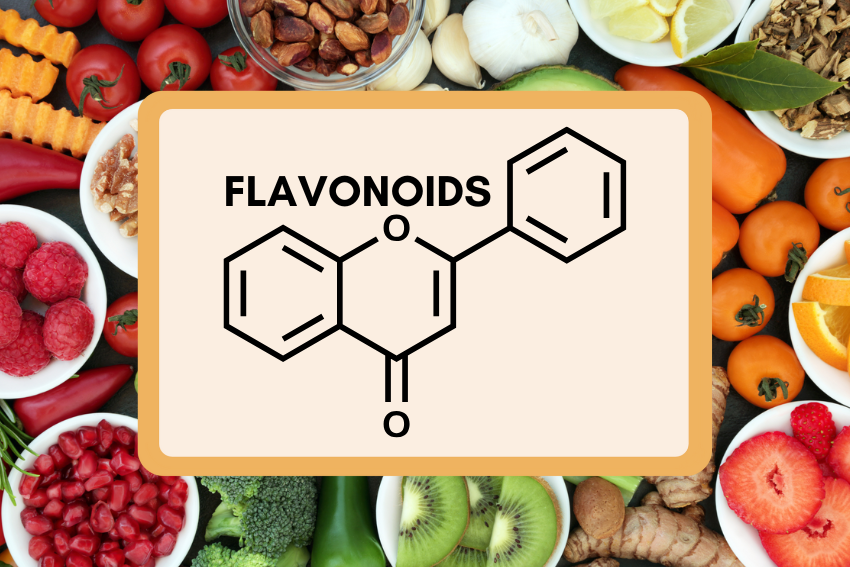Proper nourishment is very crucial in man and the absence or poor supply can lead to so many diseases. The more we understand how the human body works the more scientists find out about some nutrients that are useful in our diets. They are a category of polyphenolic compounds included in many plant foods, and several relevant works have confirmed its importance regarding nutrition and health. The purpose of this article is to give general information about flavonoids, where they originate from, what they do in our body, their health benefits and how one could increase the intake of these compounds.
What are Flavonoids?

Flavonoids are a large group of chemotaxonomic phosphorylated phenolic compounds that are naturally occurring and act as plant secondary metabolites that impart colors to fruits, vegetables and flowers. They are part of a family of chemicals known as polyphenols that play an antioxidant role in the body. More than 15 classes of flavonoids can be identified including flavanols, flavones, flavanones, flavanols, anthocyanidins and isoflavones. Currently over 6000 known variants of flavonoids have been discovered within the flavonoid superfamily.
Sources of Flavonoids
Flavonoids are found in a large variety of products, including fruits and vegetables, grains, nuts, and beans. More important sources include berries, citrus fruits, red grapes, apples, and red onions. It found in foods include green tea, black tea and dark chocolate. It is recommended that you should include many of these foods in your diet to increase your flavonoid levels.
Flavonoids in Nutrition
Flavonoids were shown to possess several valuable characteristics, which contribute to essential functions in nutrition. Their antioxidant properties enable them to combat free radicals in the body which is dangerously harm full reactive particles that can compound various diseases. Antioxidants are required for health since they prevent cell damage which is associated with various diseases of aging and other illnesses.
Besides having the potency of freeing radical oxygen species, flavonoids have been discovered to exercise anti-inflammatory actions. They can reduce synthesis astringent agents like cytokines that cause chronic inflammation associated with some diseases like cardiovascular diseases, diabetes and cancer.
Role in Health
New studies have established that Foods containing flavonoids may decrease risks of many diseases and enhance health.
1. Heart Health
Much research has been done shows that flavonoids are very essential in the functioning of the cardiovascular system. It is marked that they can decrease blood pressure, increase blood circulation, and prevent blood clots. Flavonoids also help with cholesterol, decreasing the level of LDL (which is negative) cholesterol and increasing the levels of HDL (which is positive) cholesterol. Thirty-two articles on this topic present substantial evidence that indicate an inverse relationship between flavonoid consumption particularly flavanols and anthocyanins and the danger of developing heart diseases.
2. Brain Health
The same flavonoids at also rich in the promotion of brain health. Cognitive changes they support may enhance thought process and hinder cognitive decline. There are some studies showing that people who take flavonoid-containing foods can lower the chances of developing neurodegenerative diseases, including Alzheimer disease and Parkinson’s disease.
3. Cancer Prevention
There were many in vitro and in vivo experiments that have shown that flavonoids possess anticancer potential. By slowing or preventing the formation of new cancer cells, and by helping to destroy cancer cells and strengthen the body’s defenses against cancer, they can help. There are some epidemiological studies according to which total flavonoids intake negatively correlates with some types of cancer such as breast, prostate and colorectal ones.
4. Diabetes Management
As a result, it may bring a possible health benefit of the flavonoids aiding in its blood sugar regulation. Studies also reveal that flavonoids probably help in increasing insulin sensitivity, increasing glucose uptake, and decreasing insulin resistance. In addition, flavonoid consumption may have a protective effect on inflammation, which is a critical precursor to type 2 diabetes.
5. Bone Health
Some constituents in fruits such as flavonoids were said to have positive impact on bone health. According to some scientific reports, they can be useful in promotion of bone mineralization, prevention of bone resorption and fracture risk reduction. Components of the flavonoids can further influence the osteoblasts and decrease the production of cystic-fibrosis transmembrane-conductance regulator protein by the osteoblasts.
Ways to Get More Flavonoids
For one to be able to gain from the many health benefits associated with flavonoids it is important that they incorporate them into their diet. Here are some tips on how to increase your flavonoid intake:
Consume a wide variety of fruits and vegetables: Fruits and vegetables should ideally be of different colors and the recommended ones include berries and citrus fruits, greens, red and orange products, herbs, and spices. That means the wider the variety, the more flavonoids will be ingested into your body.
Choose whole fruits over fruit juices: Nevertheless, as fruit juices are generally less rich in flavonoids than fruits, they require to have been unheated. Whole fruits also contain healthy fiber which is absent in juices. This is especially so when one compares between whole and processed fruits.
Opt for dark chocolate: It must be noted, however, that cocoa products should be consumed sparingly because of their sugar and calorie content; that being said, a 70 percent or higher cocoa dark chocolate is a rich source of flavonoids.
Drink tea: Flavonoids are also present in high amounts in both green and black tea. Ideally, you should consume about 2-3 cups of tea, to get your daily flavonoid dose.
Choose whole grains: Oats, barley and wheat are examples of whole grains that have flavonoids that are good for the body. Instead of refined grains items such as breads, pastas and cereals, stick to products made from whole grains.
Conclusion
Flavonoids are a basic group of nutrients that act as a central function in the nutrition and health of an individual. These chemicals have antioxidant and anti-inflammatory effects and have been associated with benefits for the heart, brain, cancer, diabetes and bones. To benefit from the load of flavonoids, endeavor to eat fruits, vegetables, whole grain foods and tea. Come back to the fact that it is necessary to focus on different types of flavonoid-containing foods to get the maximum of the health benefits.






